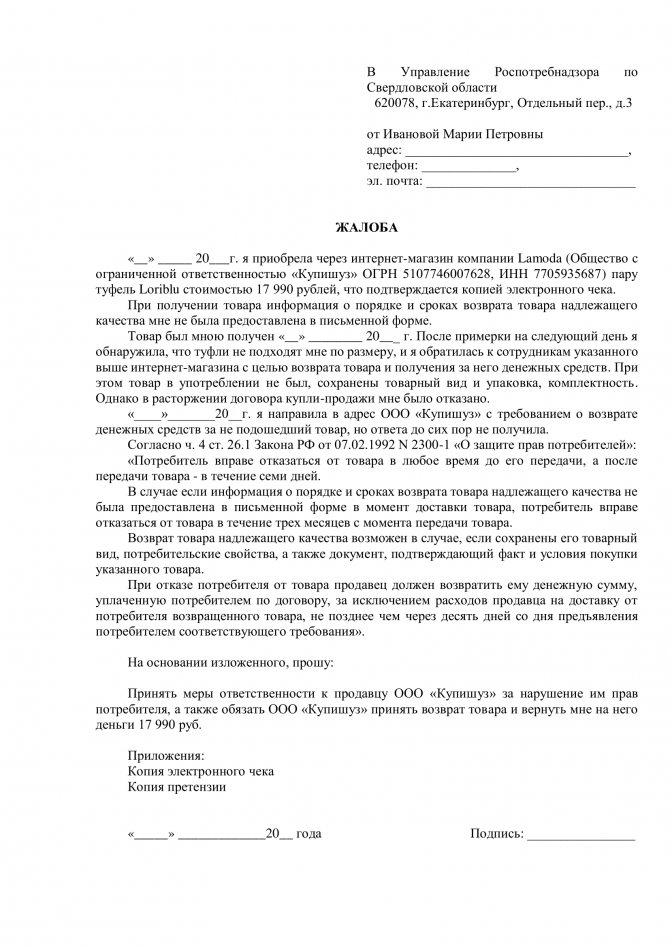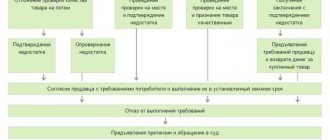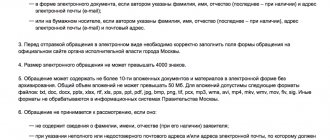What is it and what does it do?
According to Decree of the Government of the Russian Federation No. 322 of June 30, 2004, Rospotrebnadzor is a government body that develops and implements state policy in the field of consumer rights protection. The activities of this authority are based on the following regulations:
- Federal Law No. 52 of March 30, 1999;
- Federal Law No. 2300-1 dated February 7, 1992;
- Decree of the Government of the Russian Federation No. 154 of April 6, 2004
The central office and territorial divisions of Rospotrebnadzor interact with other federal executive authorities, various public associations and other similar organizations.
Nuances of consideration
The procedure for considering appeals by Rospotrebnadzor is clearly stipulated at the legislative level. The basic rules of this process include:
- applications are registered within 5 days from the date of acceptance, and this time is intended to verify the application, since it must comply with legal requirements;
- an official is allowed to make requests to various government agencies to obtain additional information on a given case;
- The application is considered within 30 days from the date of registration, but in some situations it is allowed to increase this period by up to 30 days, but the applicant must be notified about this in writing.
It is not allowed to submit an application to Rospotrebnadzor with a demand to appeal the court decision.
The reception of applications by Rospotrebnadzor is clearly regulated, so this procedure should be well studied by citizens. The citizen is notified in writing about the results of consideration of the application. To do this, a corresponding letter is sent to his residence address, and the address should be indicated directly in the application.
If a citizen enters his email address in the complaint, a response will be sent to him.
Structure of the federal body
The structure of Rospotrebnadzor has a central office and territorial branches. The first includes the following authorities:
- Regional Offices of Rospotrebnadzor.
- Centers for epidemiology and hygiene in the constituent entities of the Russian Federation.
- Scientific research institutes (SRI).
- Anti-plague stations and institutes.
- Sanitary and epidemiological services of departments and ministries.
Rospotrebnadzor has 84 regional departments and 84 hygiene and epidemiology centers. Also under the jurisdiction of this Federal Service are 29 research institutes, 12 anti-plague stations and more than 100 disinfection organizations.
Directorates in the constituent entities of the Russian Federation and their powers
84 Rospotrebnadzor departments for the constituent entities of the Russian Federation are located in various federal districts (FD):
- There are 19 authorities in the Central Federal District, including the Railway Transport Department;
- in the Northwestern Federal District - 11;
- in the Siberian Federal District - 12;
- in the Far Eastern Federal District - 9;
- in the Southern Federal District - 7;
- in the Volga Federal District - 14;
- in the Ural Federal District - 6;
- and in the North Caucasus Federal District - 7.
Each Rospotrebnadzor Directorate for a constituent entity of the Russian Federation is subordinate to the corresponding territorial offices. The structure of such a department for railway transport includes sections, departments and sanitary quarantine checkpoints.
What federal Centers for Hygiene and Epidemiology exist and what are they responsible for?
The structure of the Central Office of Rospotrebnadzor includes the following authorities:
- Centers for hygiene and epidemiology in the constituent entities of the Russian Federation, in Moscow, in St. Petersburg.
- Hygiene centers for railway transport.
- FBUZ "Federal Center for Epidemiology and Hygiene".
- Information and methodological center of Rospotrebnadzor.
Territorial branches are subordinate to the Centers for Hygiene and Epidemiology in the constituent entities of the Russian Federation. Subordinate to the Centers for Hygiene and Epidemiology for Railway Transport are the road branches of the Russian Railways.
Scientific organizations and their functions
The structure of Rospotrenadzor includes 2 types of scientific organizations - hygienic and epidemiological. The first authorities are the following:
- Federal Budgetary Institution "Medical and Scientific Center for Health Protection and Prevention of Workers of Industrial Enterprises" (Ekaterinburg);
- Federal Budgetary Institution "Research Institute of Hygiene" (Nizhny Novgorod, Novosibirsk, St. Petersburg, Saratov);
- Federal Budgetary Institution "North-Western Scientific Center for Hygiene and Public Health" (St. Petersburg);
- Federal Budgetary Institution "Research Institute of Human Ecology and Occupational Medicine" (Ufa);
- Federal Budgetary Institution “Scientific Center for Risk Management” (Perm);
- FSUE “All-Russian Research Institute of Railway Hygiene” (Moscow);
- FBUN "Federal Scientific Center of Hygiene named after F.F. Erisman" (Mytishchi).
The scientific organizations of Rospotrebnadzor with an epidemiological profile are the following:
- Federal Budgetary Institution “Scientific Center of Biotechnology and Virology “Vector”” of Rospotrebnadzor (Novosibirsk Region, Koltsovo);
- Federal Budgetary Institution "Research Institute of Microbiology and Epidemiology" (Moscow, Khabarovsk, Kazan, Nizhny Novgorod, St. Petersburg);
- Federal Budgetary Institution "Scientific Center for Applied Microbiology" (Obolensk);
- Federal Budgetary Institution "Research Institute of Viral Infections" (Ekaterinburg);
- FBUN "Research Institute of Disinfectology", FBUN "Central Research Institute of Epidemiology" (Moscow);
- Federal Budgetary Institution "Research Institute of Infectious Regional Pathology" (Tyumen);
- Federal Budgetary Institution "Research Institute of Natural Focal Infections" of Rospotrebnadzor (Omsk);
- Federal Budgetary Institution "Research Institute of Parasitology and Microbiology", Federal Public Health Institution "Antiplague Research Institute (Rostov-on-Don);
- FKUZ "Antiplague Research Institute" (Volgograd, Stavropol, Irkutsk);
- FKUZ "Russian anti-plague research institute "Microbe" (Saratov).
Specialists of the Federal Service carry out sanitary and quarantine monitoring at 285 checkpoints, including 102 at motor vehicles, 67 at airports, 64 at sea, 13 at river crossings, 39 at border railway stations.
What is included in the anti-plague service and what issues does it solve?
The anti-plague service of Rospotrebnadzor includes a network of specialized regional healthcare institutions that carry out sanitary and epidemiological surveillance in order to prevent the emergence and spread of plague diseases. The structure of this authority includes the following divisions:
- Russian anti-plague research institute "Microbe" (Saratov).
- Anti-plague center of Rospotrebnadzor (Moscow).
- Anti-plague Research Institute (Volgograd, Irkutsk, Rostov-on-Don, Stavropol).
- Anti-plague station (Gorno-Altaisk, Astrakhan, Makhachkala, Nalchik, Ussuriysk, Novorossiysk, St. Petersburg, Rostov-on-Don, Kyzyl, Khabarovsk, Chita, Elista, Simferopol).
- FKUZ "Mikrob" is the parent organization of the anti-plague service of Rospotrebnadzor.
Sanitary and epidemiological services of ministries and departments
The following ministries and departments have sanitary epidemiological services of Rospotrebnadzor:
- Ministry of Defense of the Russian Federation;
- Ministry of Internal Affairs of the Russian Federation;
- FSB of the Russian Federation;
- FSO of the Russian Federation;
- Administration of the President of the Russian Federation;
- Main Directorate of Special Programs of the President of the Russian Federation;
- Federal Penitentiary Service of the Russian Federation;
- Federal Medical and Biological Agency of the Russian Federation.
The structure of the Rospotrebnadzor Sanitary and Epidemiological Service includes main and district centers of state sanitary and epidemiological supervision (TSGSEN), their branches and sanitary and epidemiological laboratories.
When can a service be considered poorly provided?
Any services provided with the following violations will be considered low-quality:
- The result of the contractor’s actions was causing material damage to the customer, harming his life and/or health;
- During the execution of the work, technology was violated and low-quality materials were used;
- The service does not meet the parameters and requirements specified in the agreement;
- The purpose of the service order was not achieved.
Any reason why you considered the service to be poorly provided will need to be justified and supported by relevant evidence in the complaint. It is permitted to use video and photographic materials, copies of guarantees and work acceptance certificates, results of an independent examination, receipts confirming payment, copies of service agreements, etc.
What does the Department do, to whom does it make demands and issue orders?
In accordance with Decree of the President of the Russian Federation No. 636 of May 21, 2012, part of the functions of the Ministry of Health of the Russian Federation, the Ministry of Economic Development of the Russian Federation and the Federal Antimonopoly Service of the Russian Federation were transferred to Rospotrebnadzor. Rospotrebnadzor is vested with the functions of developing and approving state official sanitary and epidemiological rules and hygienic standards.
Within the framework of its powers, Rospotrebnadzor carries out the following types of inspections:
- Planned.
- Unscheduled.
- Documentary.
- Traveling.
In general, the powers of Rospotrebnadzor of the Russian Federation include monitoring compliance with Federal Law No. 52 of March 30, 1999 and Federal Law No. 2300-1 of February 7, 1992.
The scope of authority of Rospotrebnadzor includes the following activities:
- sending mandatory instructions to heads of federal services, ministries and departments;
- suspension, if necessary, of decisions of federal services and agencies (their heads) or cancellation of these decisions;
- supervision of the current sanitary and epidemiological situation in public catering establishments, in apartments and private houses, in various educational and medical institutions;
- control over the implementation of Russian legislation in the field of consumer rights protection;
- preparation of various expert opinions;
- social and hygienic monitoring;
- certification of workers engaged in professional licensed activities;
- establishing the causes and conditions of the emergence and spread of mass diseases (poisonings);
- sanitary and epidemiological examination, examination and other types of assessment;
- preparation of a sanitary and epidemiological report;
- preparation of proposals for the introduction and abolition of restrictive measures (quarantine) on the territory of a specific subject of the Russian Federation;
- product certification;
- registration of Chernobyl victims and other similar persons who suffered from radiation exposure or chemical contamination, etc.
When various violations of Russian sanitary legislation are identified, which pose a threat of the spread of mass diseases (poisonings), Rospotrebnadzor suspends the following activities:
- design, construction of facilities and their commissioning;
- operation of equipment, workshops and areas;
- production and use of various food and other products;
- production, sale and storage of various food additives, products, raw materials, drinking water, etc.
Within the framework of its powers, Rospotrebnadzor issues orders to individual entrepreneurs and legal entities to conduct sanitary and epidemiological examinations, to stop violations of consumer rights, to carry out various sanitary measures, etc.
Continuing the topic about the activities of Rospotrebnadzor, we offer to learn how to submit a notification to Rospotrebnadzor about starting a business activity and why a register of sanitary and epidemiological conclusions is needed.
What to write in a complaint?
The outcome of a complaint largely depends on how it is formulated. Thus, the complaint must meet the requirements established by the Law on Citizens' Appeals for Applications to Government Agencies:
- the complaint must contain the name of the authority to which it is sent, the personal data of the applicant (full name and address), the essence of the complaint, a list of attachments, date and signature;
- Insults and obscene language in the text are not allowed.
In addition, the complaint must be justified and contain the necessary evidence of the existence of the problem, as well as references to the provisions of the law or clauses of the contract violated by the seller.
Contents and sample of the complaint
The document is drawn up in free form, but in accordance with the rules of business writing. If the complaint is submitted in paper form, the document must begin with a header that indicates information about the recipient and sender of the complaint.
The content should be concise and succinct, especially if the complaint is submitted via the Internet, because you need to keep it to 4000 characters! It is better to skip emotions and experiences and add more specifics: indicate dates, product name, full names of employees, document details, etc.
After the description of the problem itself, there must be a motivational part with justification of the requirements and links to relevant laws. At the end the requirements themselves are listed. The paper version also lists the attachments and includes a date and signature.

Sample complaint
What questions can I contact?
Rospotrebnadzor is contacted on the following issues:
- violation of established rules for storage and removal of solid waste;
- charging fees for housing and communal services in excess of established standards;
- poor quality work of the management company in maintaining and repairing the common property of an apartment building.
The most common violation of rights in the housing and communal services sector is consumer fraud. More often, Rospotrebnadzor is contacted when services are provided improperly or not in full, or when payment receipts indicate incomplete (false) information about housing and communal services and their providers.
If you are affected by the problems described above, then in a separate article we suggest learning how to correctly draw up and submit a complaint to Rospotrebnadzor.
The nuances of sending by post
This method is the least popular, but it is considered relevant if the complaint contains a large amount of information, as well as if many additional documents are attached to it.
Using a notification of delivery, you can find out in advance exactly when the complaint was received by Rospotrebnadzor employees. In addition to the direct complaint, it is advisable to attach other documents related to the violation.

Methods of administrative action in case of violation of the law
When identifying various violations in the field of consumer rights protection, Rospotrebnadzor resorts to the following methods of administrative influence on organizations:
- bringing to administrative or criminal liability persons who have committed violations of the law “On the Protection of Consumer Rights” (for example, in the housing and communal services sector);
- filing a claim in court to protect the legitimate interests and rights of consumers;
- participation in a court case to provide an expert opinion.
Rospotrebnadzor advises citizens of the Russian Federation on issues that fall within its competence. In this case, they provide practical assistance in drawing up a formal claim or lawsuit on a specific issue.
Ways to file a complaint
Writing an appeal to Rospotrebnadzor is quite easy, and you can send this document to this organization in different ways. The following methods are used for this:
- sending a complaint by post, but an inventory of the attachment and a notification of receipt must be paid so that the applicant knows exactly when the document was delivered to the employees of the institution;
- personal visit to the Rospotrebnadzor office;
- drawing up an electronic appeal, for which you will have to fill out a special form on the organization’s website.
If the main purpose of drawing up an appeal to Rospotrebnadzor is the need to hold an organization accountable or conduct an inspection against it, then the corresponding requirement is indicated in the complaint. Additionally, a requirement is prescribed to return money for low-quality goods, to fulfill the terms of the contract, or to carry out other actions by the violator.
It is advisable to attach to this appeal the response of the organization itself to the preliminary claim. This will serve as proof that the company does not want to resolve the differences that have arisen peacefully, so it has to resort to the help of government agencies.
Amounts of fines
When various violations in the field of consumer rights protection are detected, Rospotrebnadzor issues appropriate fines. The amount of penalties is specified in Art. 6.3, 14.4, 14.5, 14.7 and 14.8 of the Code of Administrative Offenses of the Russian Federation.
The amount of the fine is calculated based on the minimum wage (minimum wage). As of January 1, 2020, minimum wage = 11,280 rubles.
When various violations are detected, Rospotrebnadzor applies the following administrative penalties:
- if violations of established sanitary standards are detected, the enterprise is fined 5-10 minimum wages with the possible suspension of the legal entity’s activities until the violations are eliminated for up to 3 months;
- in case of improper use of various non-residential premises by a legal entity, Rospotrebnadzor issues a fine in the amount of 10-20 minimum wages;
- in case of sanitary and epidemiological improper control at a food production enterprise, which resulted in the poisoning of a large number of consumers, the legal entity is fined 100-200 minimum wages, etc.
If various sanitary norms and rules are not observed, which led to mass poisoning and illness of the population, the enterprise is held liable under Art. 236 of the Criminal Code of the Russian Federation. Under this article, Rospotrebnadzor issues a fine of up to 80,000 rubles. or in the amount of salary for 6 months. In the event of the death of a consumer due to negligence, the responsible officials are sent to jail for 5 years or subject to forced labor for the same period.
Authority of the organization
Rospotrebnadzor has numerous powers and capabilities that give it the right to require companies to comply with the law. These powers include:
- checking company documents, which include employment agreements, medical records and diplomas of company employees;
- studying the correctness of filling out logs;
- drawing up instructions, the main purpose of which is to eliminate violations identified as a result of the inspection;
- imposing fines on companies;
- assessment of existing certificates, permits, licenses and other documents;
- deprivation of the organization's right to continue business activities for up to 90 days;
- filing lawsuits against violators;
- checking the operation of cash registers;
- initiation of detention of violators.
Rospotrebnadzor can impose fines, the amount of which can reach even 200 thousand rubles. Therefore, when drawing up an appeal to Rospotrebnadzor, each person initiates proceedings against the violator.
How are fines paid?
Fines from Rospotrebnadzor are paid from a bank account. If the enterprise fails to pay the imposed penalties, the amount collected is blocked in the organization’s account. Then late fees are charged.
If there is no money, the current account is frozen. The blocking is removed after the next receipt of the required amount. To unblock the current account, the company pays a fine issued by Rospotrebnadzor.
Rospotrebnadzor is a federal service that oversees the protection of consumer rights. If a violation is detected, representatives of this authority impose various fines. In some situations, violators of the law “On Protection of Consumer Rights” are brought to criminal liability.
Rules for filing a complaint
Before drawing up any application, it is advisable to study examples of applications to Rospotrebnadzor. The basic rules for its preparation include:
- is formed exclusively in written form;
- when compiling the text, legal requirements related to the procedure for drawing up appeals from citizens are taken into account;
- it is important to clearly state the essence of the specific violation;
- all information must be reliable and confirmed by official documents.
If the above requirements are not met, this will be the basis for Rospotrebnadzor employees to refuse to accept the application.





